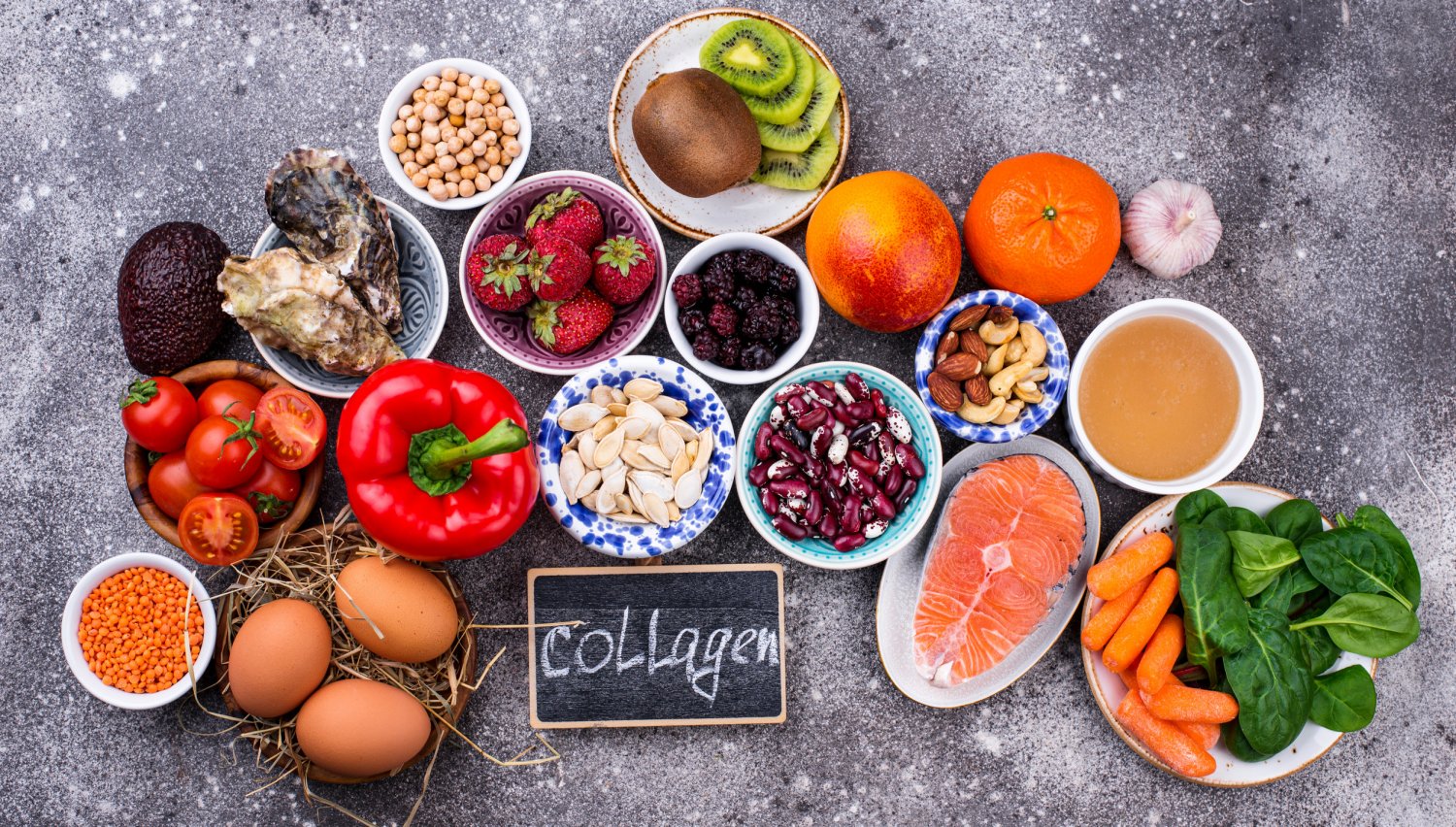
by Matt Weik, BS, CSCS, CPT, CSN
Collagen supplements have been a hot topic over the years with both men and women using them for various reasons. But did you ever stop to consider what high-collagen foods you could be consuming that also provide you with an adequate amount of collagen?
Collagen is the structural protein powerhouse in our body. It constitutes around 70% of the dermis and is essential for maintaining youthful skin. Collagen forms a network of fibers that provides elasticity and tensile strength, allowing skin to recoil and stretch.
Collagen combines with water molecules to create a plumping effect, which helps hydrate the skin and gives it a healthy, dewy look.
Collagen fragments act as signaling molecules that trigger processes like fibroblast activity, which is essential for skin cell renewal and wound healing.
Simply put: collagen does a whole heck of a lot of things in the body.
Collagen production drops as you get older, though your body creates this protein on its own. While collagen supplements have gained popularity, some high-collagen foods can boost the levels in your body.
In this article, we will dive deeper and go through some of the best high-collagen foods to add to your diet.
Disclaimer: This article is for informational purposes only and is not meant to treat or diagnose any condition. It is recommended that you speak with your doctor before starting any exercise program, changing your daily nutrition, or adding any supplements to your regimen.
10 Best High-Collagen Foods You Should Be Eating
Below are the 10 best high-collagen foods to add to your diet to boost your intake. You may notice that not all of the foods actually contain collagen, but it’s essential in the formation of collagen in the body. Let’s dive in!
1. Chicken
Chicken is a natural source of collagen, especially in its connective tissues. This explains why many collagen supplements use chicken as their base.
A 2022 mouse study found that collagen from chicken bones and cartilage helped reduce arthritis symptoms and inflammation.
Different parts of the chicken offer varying amounts of collagen; you will find more in thigh meat than breast meat.
2. Bone broth
When you cook bones and connective tissues, they break down into collagen components and complex sugars. This process creates glycine and glutamine, which tell your skin cells to make more collagen.
Studies show that bone broth may also help decrease inflammation, which could benefit your digestive health and skin.
3. Fish and shellfish
Fish skin and scale, to be particular, are great sources of collagen. Fish-derived collagen, or marine collagen, has superior bioavailability, which means it is absorbed more efficiently than other sources.
This marine collagen is mainly Type I, which helps keep your skin elastic and strengthens bones and tendons. If you eat fish but avoid meat, fish is one of the high-collagen foods you should consider, as it offers a natural way to get collagen.
Consider keeping the skin on when you eat salmon, or try a salmon skin roll at your next sushi meal.
4. Egg whites
Egg whites contain proline, which helps your body make collagen. You can add them to your diet in many ways, such as scrambled, boiled, or blended into drinks. They support skin elasticity and help your body produce collagen naturally.
You can make an egg white omelet with spinach and garlic for a healthy collagen boost. Egg whites are low in calories and fat, so they are good for those watching their weight.
5. Citrus fruits
Citrusy fruits like oranges, lemons, and grapefruits are loaded with vitamin C, which is an essential nutrient that helps the enzymes needed for the synthesis of collagen.
Research shows that our body struggles to make collagen without enough vitamin C.
6. Leafy greens
Dark leafy greens offer vegetarians a way to boost collagen production naturally.
Vegetables like spinach, kale, rainbow chard, and collard greens contain vitamin C, which aids collagen formation.
These greens also contain chlorophyll, which increases procollagen levels, an essential step in making collagen. Hence, they are valuable for maintaining healthy collagen levels in the body.
7. Beans
Plant-based eaters can consume beans for collagen support.
Research shows that regular beans provide amino acids that help your body make collagen. Their high protein content makes them an excellent choice for maintaining collagen production.
8. Berries
Berries are packed with anthocyanins, a powerful antioxidant that may protect collagen from breaking down. These nutrients not only support existing collagen but may also improve skin elasticity.
Studies suggest that incorporating berries into your diet can help preserve collagen and promote healthier, more elastic skin.
9. Garlic
Garlic may not contain collagen, but it supports your body’s collagen production. Garlic is rich in sulfur, which helps produce collagen and prevents its breakdown.
Additionally, it contains taurine and lipid acid, which aids in repairing damaged collagen fibers. You can include garlic in your meals as it is a simple and effective way to boost your body’s natural collagen production.
10. Dairy products
Dairy products like milk, cheese, and yogurt don’t contain collagen but are rich in proline and glycine, two amino acids essential for collagen synthesis. These amino acids help maintain skin elasticity, strengthen bones, and support joint health.
Furthermore, nutrients like calcium and vitamin D in dairy work together to promote overall bone health and development.










